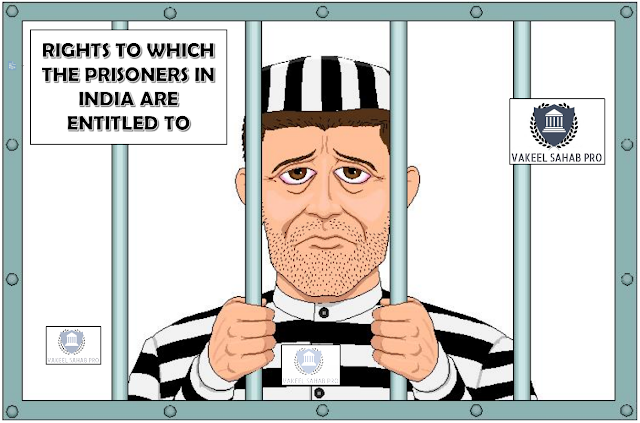This article is written by P KAVYA, 3rd-year BALLB student from MAR GREGORIOS COLLEGE OF LAW, Kerala.
“It is said that no one truly knows a nation until one has been inside its jails. A nation should not be judged by how it treats its highest citizens but by its lowest ones” -
NELSON MANDELA
TABLE OF CONTENTS
- INTRODUCTION
- RIGHT OF PRISONERS
- FUNDAMENTAL RIGHTS GUARANTEED TO THE PRISONERS
- RIGHT TO LEGAL DEFENCE AND FREE LEGAL AID
- RIGHT AGAINST INHUMAN TREATMENT
- RIGHT AGAINST ILLEGAL DETENTION
- RIGHT AGAINST SOLITARY CONFINEMENT
- RIGHT OF PUBLIC TRIAL AND SPEEDY JUDGEMENT
- RIGHT TO APPEAL
- RIGHT TO MATERNITY FOR THE WOMEN PRISONERS
- PRISONS ACT,1894
- CONCLUSION
INTRODUCTION
The Right of Prisoners is among the seldom realized rights in India. Among the various methods of punishment, ours is a reformatory method, still, in the jails of India, we could hear the fear cries of pain, cruelty, and suffering. But the sad fact is that the cries are of poor men who are unable to meet the expensive needs of the jail officials. Treatment of prisoners in India is so unsatisfactory and violative of all the basic rights of a human and they are deprived of the basic facilities in jail. This article is written with the aim that every citizen should be aware of the right of prisoners and it must be upheld in order to stop the atrocities and cruelties to which they are thrown upon so that there will be no more custodial deaths, rapes, and slavery inside the prisons of India.
RIGHTS OF PRISONERS IN INDIA
There are no comprehensive legislation regarding the right of prisoners and their conduct in prison. A human behind the bars of prison is still a human. Their rights are mainly upheld by the judiciary by interpreting Article 21 of the constitution. In the case of T.V. Vatheeswaran v. State of Tamil Nadu (1), it is held that even if the requirements of Article 21 is denied, Article 14 and Article 19 of the constitution can still stand, hence even if there is a law prescribing a procedure for depriving a person’s liberty, the procedure has to be fair, just and reasonable.
FUNDAMENTAL RIGHTS GUARANTEED TO THE PRISONERS
These are the basic rights that are guaranteed to a prisoner. The case of Sunil Batra v. Delhi Administration(2) is a case of landmark judgment in which the Fundamental Rights of the Prisoners were upheld. In this case, the court held that Article 21 must be in conformity with Article 14 and Article 19, i.e. the law prescribing for the deprivation of the personal liberty of a person must be in conformity with article 14 and article 19. It also pointed out the necessity in bringing the law that protects the prisoner's right to medical care, right to be treated with dignity, etc. In State of Maharashtra v. Prabhakar Pandurang Sanzgiri,(3) the court held that the fact that the person is put behind the bars does not make him lose all his fundamental rights, only the rights which are incidental to the confinement are lost. The prisoners are deprived of certain fundamental rights such as the right to movement, the right to practice a profession, etc. as incidental to the confinement
RIGHT TO LEGAL DEFENCE AND RIGHT TO FREE LEGAL AID
Article 22(1) of the Indian Constitution states that no person shall be denied the right to consult and the right to be defended by the legal practitioner of his choice. The Right to Defence comes under the basic rights of an arrested person. Section 303 of the Criminal Procedure Code which provides for the representation of a leader of one’s own choice is also in accordance with this right. Article 39A of the Indian Constitution, incorporated by the 42nd amendment mentioned the services of free legal aid under the Directive Principles of State Policy. Article 39A provides that the state shall secure that no citizen is denied justice due to their economic conditions or disabilities, hence to provide an equal opportunity the state shall provide free legal aid to indigent persons. M.H.Hoskta v.State of Maharashtra(4) it is the first case to discuss the Right to free legal aid, it also pointed out that the right to free legal aid for indigent people is a fundamental right hence a violation of it is potentially a violation of the fundamental right of the prisoner.
RIGHT AGAINST INHUMAN TREATMENT
Every prisoner has the right to be protected against inhuman treatment. But the sad reality is that the Slavery system still exists inside the prisons of India. The black hole of Calcutta is a tragic example of the inhuman treatment of the prisoners in jail. It was in December 1980 in Bhagalpur Jail that the inhuman act of ‘blinding the prisoners’ was reported. Mr. justice Bhagwati and Mr. Justice Venkataramaiah of the Supreme Court of India defined the act of blinding as a barbaric act and held it was a crime against mankind and violative of Article 21. This incident in Bihar shocked mankind and questioned the conscience of the jail officials. In the case of D.K.Basu v. State of West Bengal(5), the court observed that custodial deaths are the more aggravated crime because it is done by the protectors of law. Such cases of inhuman treatment of prisoners are numerous. In view of this, the Supreme court of India prohibits the use of chains, irons, and straitjackets while punishing the prisoners.
RIGHT AGAINST ILLEGAL DETENTION
The undertrials serving more than the term of punishment waiting for the trial inside the jail is the gross injustice done towards them. It is in the case of Hussainara Khatoon v. State of Bihar(6), the plight of undertrials became noticed. The court directed that the undertrials who have been in jail for the term exceeding their term of punishment if they would have been convicted should be released, otherwise it will be a violation of their fundamental right. Here the court granted a charter of freedoms for the undertrials. Our legal system must found a way to meet the rights of the undertrials in jail in cases where they are acquitted of.
RIGHT AGAINST SOLITARY CONFINEMENT
First, there is a need to distinguish between confinement and solitary confinement. Confinement does not imply cellular isolation. The segregation of one person all alone in a single cell is solitary confinement. In the case of Kishore Singh Dev v. State of Rajasthan(7), Supreme Court defined solitary confinement and directed it to be invoked only in rare cases. If a person is directed to solitary confinement, he must be checked upon daily by a medical examiner in his cell. In another case, it is held that solitary confinement should only be given in cases where the prisoner is of a highly dangerous nature that the segregation is necessary. Still as a disciplinary action, in many jails, the prisoners are subjected to solitary confinement which is violative of their basic human rights.
RIGHT OF PUBLIC TRIAL AND SPEEDY JUSTICE
There should be a public trial for the offenses. It is given in section 327 of the Criminal Procedure Code, 1973 that the proceedings of the trial to be held in an open court unless and until if it is a case of sensitive nature. The right to a public trial is implicit in Article 14, Article 19(1)(a), and Article 21 of the Constitution of India. Crime against women such as rape, or offenses mentioned in 376 and its amendments and such cases of sensitive nature are exceptions to section 327 of the Criminal Procedure Code.
The right to a speedy trial is among the universally recognized basic human right. It is considered as the essence of the criminal justice system. When a person gets accused of, he should be subjected to a speedy trial and accordingly convict or absolve him whether he has committed the crime or not. The right to a speedy trial is also mentioned in section 309 of the Criminal Procedure Code. In A.R.Antulay v. R.S. Nayak(8), the court held that the Right to speedy trial is a right under Article 21 and it includes all stages of inquiry. There cannot be any time limit for the proceedings as it depends on the circumstances of each case. The court in the interest of the natural justice held that if there is a violation of the right to speedy trial then the charges of the conviction shall be quashed. There is a famous saying that justice delayed is justice denied, which upheld the right to speedy trial at its utmost importance.
RIGHT TO APPEAL
A fair procedure is one of the applications of natural justice. Right to appeal is a constitutional and statutory right hence every prisoner is entitled to the Right to Appeal. Technicalities and legal niceties are no impediments to the court’s entertaining even an informal communication as a proceedings invoking article 32 and 226 of the Constitution if the facts are found to be true.(9) The court can grant the Right to Appeal for a prisoner under Article 142 read with Article 21 and 39A of the constitution. Article 142 of the constitution says that the Supreme court can say directions or pass orders in order to render complete justice which gives the Supreme Court the power to make any guidelines for the right of prisoners.
RIGHT TO EDUCATION
Right to Education is a fundamental right of a citizen of India; the prisoners also must have access to education inside the prison. The Supreme Court of India had provided certain guidelines regarding the education of the prisoners in Muhammad Giasuddin v. State of AP(10), the manner of work and education should be regulated, and also the inmates interested in higher studies should also be provided with education through correspondent courses. The women prisoners should also be taught basic learning such as embroidery, doll making, tailoring, etc. In another case where a prisoner was not allowed to read a scientific book, the Supreme Court held that there is no provisions prohibiting the prisoner from reading, writing, or publishing a book unless it is against the public interest or safety.
RIGHT TO MATERNITY HEALTH FOR WOMEN PRISONERS
Over 6 percentage of prisoners in India are women, in 2016 more than 3 lakh of women were arrested for various offenses. There are some rights guaranteed to pregnant women in prison which is often ignored by the authorities. Women prisoners must be provided with urine pregnancy kits as per their requirement and it should be free of cost. Pregnant women should be given information regarding her right to abortion. As per the National Model Prison Manual, a special diet should be allowed for the pregnant women and also there can be a temporary release of pregnant prisoners for the delivery of children in a hospital situated outside the prison. Also, instruments of restraint, solitary confinement or any other form of punishment that affects the mental health of pregnant women should be avoided.
Some of the other rights to which the prisoners are entitled, are the Right to reasonable wages in prison, Right to privacy, Right to meet friends, relatives consult lawyers, etc.
PRISONS ACT,1894
The Prison Act is one of the oldest acts in India in relation to prisons and their functioning. In the prisons act, there is not much about the Right of Prisoners, it mainly deals with the definition of prison and the procedures in jail. According to the Act, a prison is a place for the detention of prisoners temporarily or permanently under the orders of the state government. It is also clearly mentioned that there shall not be any business dealings between the jail officials and prisoners. The separation of prisoners should be done on the basis of gender, undertrials, and convicts, civil and criminal.
CONCLUSION
There should be a codified legislation that lays down rights the prisoners are entitled to and the principles of guidance to be followed by the jail officials. The undertrials serving more than the term of punishment waiting for the trial inside the jail is a gross injustice. Our prison should be a correctional house rather than a house that nourishes a new prisoner. Persons behind the bar are human too, prisoners should not be excluded from society, but they are also a part of it. When the prisoners’ rights get upheld, it would pave the way to the changed attitude and behavior of the prison authorities.
CITATIONS
1. 1983 AIR 361,1983 SCR (2) 348
2. 1980 AIR 1579,1980 SCR (2) 557
3. 1966 AIR 424, 1966 SCR (1) 702
4. AIR 1978 SCC 1548, 1979 SCR (1) 192
5. AIR 1997 SC 610
6. 1979 AIR 1369, 1979 SCR (3) 532
7. 1981 AIR 625, 1981 SCR (1) 995
8. 1988 AIR 1531, 1988 SCR Supl. (1) 1
9. K.D.Gaur, The Indian Penal Code 866 (Universal Law Publishing Co. Pvt. Ltd.)
10. 1977 AIR 1926, 1978 SCR (1) 153






1 Comments
Good job kavya❤🔥
ReplyDelete